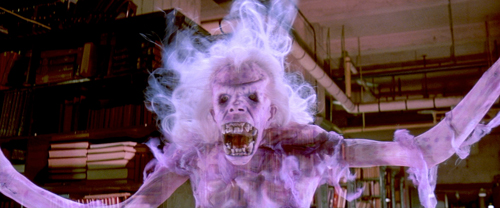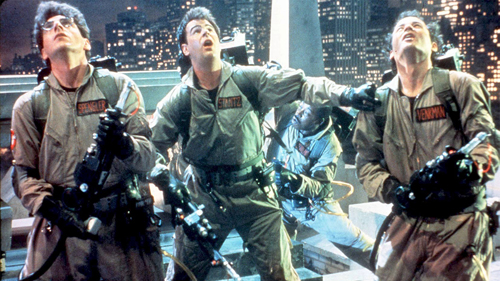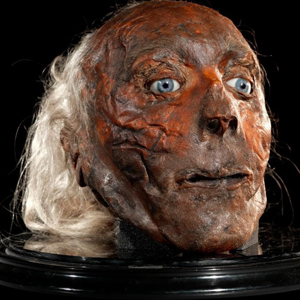
Your complimentary articles
You’ve read one of your four complimentary articles for this month.
You can read four articles free per month. To have complete access to the thousands of philosophy articles on this site, please
Films
Ghostbusters
Thomas R. Morgan ponders the phantom pain and pleasure perspective.
Despite the numerous interpretations that have been made about its themes, the original Ghostbusters (1984, directed by Ivan Reitman) contains a glaring ethical problem which has been largely overlooked in the many years since it was first released.
The problem is addressed very briefly within the film itself, when, during a montage depicting the main characters’ growing success, a copy of The Atlantic magazine flashes up with the headline ‘Do ghosts have civil rights?’. In response to the question, Matthew Phelan wrote a spoof article of that name, which focuses mainly on the legality or otherwise of ghostbusting practices. It also briefly compares ghosts with illegal immigrants. However, there remains a general lack of exploration of the moral question of ghost-catching within the Ghostbusters universe.
This must in part be due to the simplicity and strength of the film’s prevailing gimmick – a group of maverick scientists catching and containing ghosts. Another difficulty with tackling the ethics of ghostbusting stems from the challenge of defining ‘ghosts’ themselves, not as metaphors, but as actual and existing entities. Much that has been written about these insubstantial beings has not really helped when trying to consider their ethical status.
I want to simplify the question of whether or not ghosts should be busted by considering how Australian moral philosopher Peter Singer’s early system of ethics might be applied, given that Singer is well-known for taking into account non-human life in his particular form of utilitarianism.

Silence in the library!
Plot
In the Ghostbusters’ universe, ghosts quickly become an undoubted, objective reality, when the three main protagonists are called to investigate strange, possibly supernatural phenomena at the New York Public Library. After observing precariously stacked books, and slime (later termed ‘ectoplasm’) coating draws and shelves, Peter Venkman (Bill Murray), Ray Stantz (Dan Aykroyd), and Egon Spengler (Harold Ramis) soon come into contact with their first free-floating spook, which acts aggressively when they clumsily attempt to make contact.
This encounter opens up a window of opportunity for our three unorthodox researchers. Ethical considerations aside, they take the risk of putting all of their (mainly Ray’s) resources into setting up business as ‘the Ghostbusters’.
It is unclear what the primary mission of this organization is: is it to continue their academic aspirations, of bringing scientific rigor to the field of the paranormal? Or is it to rid the public of troublesome supernatural entities – collectively called ‘ghosts’? Winston Zeddemore, who joins the Ghostbusters later in the story, is the only member who is clearly honest and transparent about his motives, prioritising the "paycheck" over his beliefs regarding the paranormal.There are clearly differences of interest between the individual Ghostbusters, but it would seem that the latter is their primary motivation, given not only their moniker but also given that their financial need is better met through the removal of ghosts than through studying them.
After a successful period of catching ghosts (including the ghost later known as ‘Slimer’), and of storing them in a laser-based containment facility in the basement of their headquarters/living accommodation (a reconstituted fire station), the Ghostbusters are challenged officially. Walter Peck (William Atherton Knight) from the Environmental Protection Agency questions their methods, particularly the containment facility. But this questioning is on the basis of their creating an environmental hazard, not for ignoring the interests of the ghosts they have ensnared.
Peck’s distrust of the Ghostbusters quickly becomes personal, and he attains legal permission to shut down the ghost containment unit. As a result its unwilling inhabitants are freed and the Busters themselves subsequently arrested. The ensuing chaos caused by the release of the ghosts is magnified by an apocalyptic threat from an ancient deity called Gozer who employs two lesser gods Zuul and Vinz to possess two neighbours, Dana Barrett (Sigourney Weaver) and Louis Tully (Rick Moranis). Gozer uses their apartment building as a portal into this world and as the epicenter for his destructive power. The Mayor realises the value of the incarcerated Ghostbusters and they are duly released. Eventually they use their ghostbusting proton-packs to close the portal, preventing Gozer from causing further destruction.

Film images © Columbia Pictures 1984
The Dubious Ethics of Ghostbusting
I don’t want to try to give a comprehensive definition of what a ghost is. Notable philosophers, such as William James and Henry Sidgwick, have researched and remained open-minded about the possibility of their existence. C.E.M. Joad entertained the idea that ghosts equate to the mental self of a deceased individual (possibly like a bundle of perceptions and ideas), assuming at least a temporary post-mortem existence. Dan Aykroyd, who co-wrote the film, is a believer himself, and has described ghosts as a kind of ‘physical residue’. However, even if we accept such a reductionist definition, it wouldn’t necessarily remove the moral implications of catching and trapping ghosts. After all, defining living humans as purely material beings, as many now do, doesn’t automatically condone their mistreatment.
Importantly, in the Ghostbusters universe, there are seven classifications of ghosts, taken from the fictional Tobin’s Spirit Guide. The only class that has no mental awareness at all is Class 1. This is significant when one considers that even a sentient (that is, limited to sensations, no language) level of consciousness would indicate that the being has some interests. If a being can experience sensations, it can perhaps experience ones it would rather not… And, moreover, it can be argued that if a being has interests, it becomes subject to moral consideration. This is the view that Peter Singer applied to non-human animals: they’re sentient, so they have moral rights, since they can experience pleasure or pain, and have an interest in experiencing the one and in not experiencing the other.
Originally laid out in his 1975 book Animal Liberation, Singer’s moral philosophy capitalises on the classical utilitarianism, established by the English philosopher Jeremy Bentham (1748-1832).
Concerned exclusively with the ‘two sovereign masters’ of human concern, pleasure and pain, Bentham’s utilitarianism can be encapsulated in the imperative, that we should ‘always aim to bring about the greatest happiness (or pleasure) for the greatest number of people’ in our moral conduct. If the outcome of our action shows that human happiness has been maximised by it, then we have acted correctly. Here actions generally considered to be wrong according to other rule-based ethical systems are still perfectly acceptable, since it is the ‘hedonic’ consequence (the balance of pleasure and pain produced) which is the measure of rightness or wrongness, and this is often thought to be maximised by the imposition of ethical rules.

Jeremy Bentham (RIP), ‘head’ of the Philosophy Dept at University College London. (He requested his body to be put on display there after his death.)
But Singer questioned why morality, and, more specifically, utilitarian calculations, should only consider human happiness. He argued that to actively disregard the happiness, or more broadly, the interests, of other sentient creatures, equates to a form of discrimination, or as Singer termed it, to ‘speciesism’. (In preemptive agreement with this sentiment, Bentham himself once suggested that not considering the interests of all beings could one day be seen as ‘the hand of tyranny’.)
On this more inclusive basis, Singer recommends a radical form of utilitarianism wherein an agent must weigh up the interests of all conscious beings affected in the making of a decision. This could even mean that in some situations the interests of non-human lifeforms are prioritised – particularly when the pain or pleasure produced is undeniably greater than those of the humans in question. Controversially, Singer argued that if you were faced with a choice of whose life to save, the interests of an adult monkey could outweigh those of a human foetus, for example. Apart from possibly having a sharper awareness of pleasure and pain, the adult monkey arguably has more invested in life, is possibly part of a primitive community, and has greater environmental awareness than the foetus.
Given then that Singer’s criterion for moral consideration is sentience and the interests which arise from it, why not include ghosts? If we do, the question becomes, does the pain of the ghosts busted outweigh that of the human pleasure or happiness resulting from them being busted? If it does, we ought not to bust them, on this moral scheme.
In terms of the acknowledgement, respect, and protection of any conscious being, utilitarianism is a bit of a double-edged sword. It doesn’t assign rights arbitrarily based on species or kind; but by this same token, it therefore also removes the automatic taboos around some medical practices, such as embryo research and abortion. On the other hand, it potentially expands our consideration to all lifeforms and their needs. This would imply that like any other sentient beings, ghosts shouldn’t automatically be protected (or left to haunt hotels); but equally, that they shouldn’t be automatically dismissed as morally worthless ‘vermin’ to be trapped and exterminated.
Under this form of utilitarianism, only if human interests can be proven to outweigh the ghost’s should the apparition be subject to removal (but not necessarily to incarceration). Set in this context, the question arises: does the human desire to have a tidy, well-organized library outweigh a ghost’s enjoyment of book stacking and sliming?
© Thomas R. Morgan 2023
Thomas R. Morgan is a teacher of Religious Studies, Philosophy and Ethics at Westcliff High, England.









